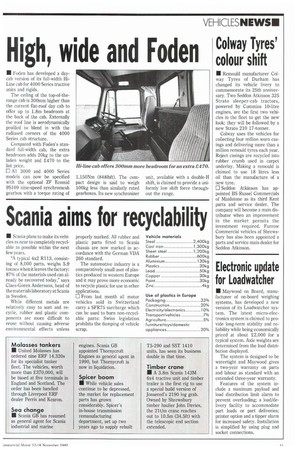Sonia aims for recyclability
Page 13

If you've noticed an error in this article please click here to report it so we can fix it.
• Scania plans to make its vehicles as near to completely recyclable as possible within the next few years.
"A typical 4x2 R113, consisting of 8,000 parts, weighs 5.9 tonnes when it leaves the factory: 87% of the materials used can already be recovered today," says Claes-Goren Andersson, head of the materials laboratory at Scania in Sweden.
While different metals are relatively easy to sort and recycle, rubber and plastic components are more difficult to reuse without causing adverse environmental effects unless
properly marked. All rubber and plastic parts fitted to Scania chassis are now marked in accordance with the German VDA 260 standard.
The automotive industry is a comparatively small user of plastics produced in western Europe and it may prove more economic to recycle plastic for use in other applications.
From last month all motor vehicles sold in Switzerland carry a SFR75 surcharge which can be used to burn non-recyclable parts: Swiss legislation prohibits the dumping of vehicle scrap.
Vehicle materials Steel 2,400kg Cast iron 1,300kg Sheet steel 1,200kg Rubber 600kg Aluminium 130kg Plastics 30kg Lead 50kg Copper 30kg Paint 30kg Zinc 4kg Use of plastics in Europe Packaging 33% Construction 20% Electricity/electronics 10% Transport/vehicles 7% Agriculture 5% Furniture/toys/domestic appliances 20%












































































